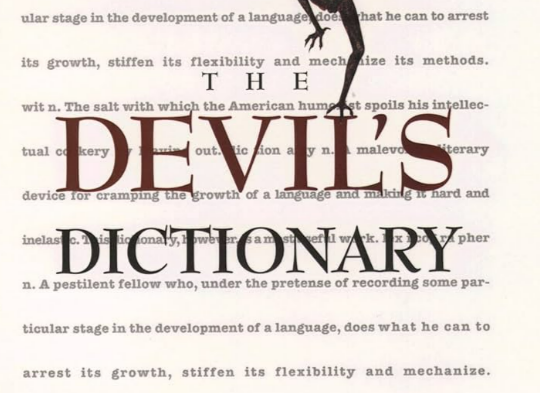Chapter I
byChapter I begins with Bierce’s clever examination of the letter I, turning it into a symbol of the self—solitary, proud, and central to all communication. He notes how “I” is both a grammatical necessity and a psychological revelation, embodying the ego at the heart of every sentence. Though it seems humble on paper, Bierce shows how “I” is used to mask pride as well as to express honesty. The contrast between its singularity and the plural “we” reveals how identity can shift based on social needs. Through this entry, he sets the tone for a chapter that balances wordplay with introspection.
Ichor, traditionally the ethereal fluid of the gods, is mocked as a glorified metaphor. Bierce treats it as an excuse for mythmakers to elevate the divine by denying human limitations, suggesting that even blood was too common for deities. The definition pokes fun at how mythology distorts reality to make belief more dramatic. In this playful reduction, divinity is stripped of mystery and reimagined as exaggerated storytelling. Bierce’s treatment invites readers to reflect on how culture often dresses fiction as sacred truth.
The word Iconoclast is given particular bite. He defines the icon-smasher not only as someone challenging tradition but as someone whom society often resists, despite secretly agreeing with their critiques. The irony lies in the public’s reverence for flawed symbols while privately recognizing their failure. Bierce illustrates how fear of disruption outweighs the pursuit of truth. This entry acts as a subtle call for courage in questioning the status quo.
His definition of Idiot delivers a sharper critique. Rather than portraying the idiot as merely foolish, Bierce expands the term to describe those whose influence reaches every level of culture and decision-making. This flips the insult into a societal mirror—those considered least wise may in fact hold power. The entry forces uncomfortable reflection on who leads and who follows. Bierce’s satire makes it clear that stupidity is not always excluded from authority.
Idleness is seen as fertile ground for vice, yet Bierce doesn’t fully condemn it. Instead, he acknowledges that inactivity can give rise to creativity, daydreaming, or worse. The ambiguity highlights how moral judgments often depend on context. By framing idleness as a metaphorical farm, Bierce suggests that what grows from it depends on who tends it. His nuanced approach avoids dogma and instead embraces complexity.
In Ignoramus, Bierce sees not just lack of knowledge, but mutual agreement in misunderstanding. The term reflects how ignorance is often shared and celebrated rather than corrected. His definition targets both the uninformed and those who tolerate or amplify misinformation. Bierce implies that ignorance, when reinforced collectively, becomes a dangerous kind of unity. It’s not individual unawareness that’s most harmful—but communal complacency.
Bierce’s definition of Impartial cleverly reveals how claimed neutrality often hides preference. He suggests that calling oneself impartial is more about public image than actual objectivity. True impartiality, he implies, is rare because judgment is shaped by experiences, fears, and desires. The critique urges readers to examine their own biases more closely. Through satire, Bierce strips away the illusion of fair-mindedness.
In defining Impostor, Bierce flips sympathy and suspicion. The impostor isn’t always a villain but sometimes just the one clever enough to navigate systems built on perception. His satire asks whether the fault lies with the deceiver or with those who demand performance over authenticity. This word challenges the reader to rethink who really deserves blame in a world ruled by appearances.
Improvidence is framed as shortsightedness disguised as freedom. Bierce’s definition mocks those who claim to live in the moment while ignoring consequences. He exposes how recklessness is often celebrated until it turns costly. In Indecision, he reveals paralysis masked as contemplation—an elegant way to critique hesitation as a form of cowardice. His entries show how behavior we call thoughtful may be rooted in fear.
Finally, in Insurance, Bierce delivers a punch of dark humor. He describes it as a system where hope is sold in exchange for fear, and protection is profitable only when disaster is expected. The definition underscores the irony of paying for something that works best when unused. Introduction, often seen as a social courtesy, becomes a tool for unnecessary familiarity, designed more for etiquette than genuine connection. Bierce points out that many customs are maintained not because they work, but because no one dares abandon them.
With each word, Bierce sharpens the edges of language to expose the contradictions that society quietly accepts. His wit is not just entertainment—it’s a scalpel. He uses humor to reveal how words often conceal as much as they reveal. In reframing each term, he challenges readers to reexamine their assumptions. This chapter, rich with irony and observation, offers a vocabulary of skepticism designed to unsettle the ordinary and make the familiar strange again.

